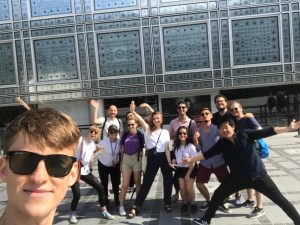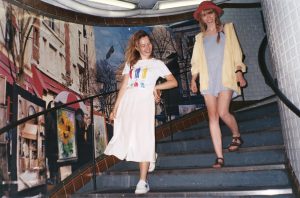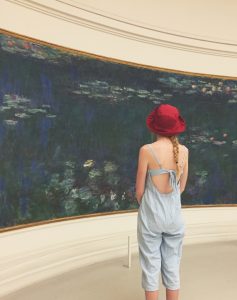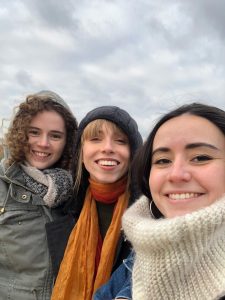My Parisian Exchange
By Lauren Ryley
Preparation
When I found out that I’d been nominated for the Sciences Po (Paris) exchange and the ERASMUS + scholarship, I was thrilled. It’s a natural choice for any politics student, but perhaps also for those pursuing their degree in economics, journalism, or law. The value of the scholarship amounts to just over 800 euros per month, but there is also a once-off payment that will cover the cost of your plane ticket and visa (it can be stretched a little more if you get a good deal – hello 10-hour layover). You will only receive these funds once you have opened a French bank account (which you cannot do remotely). This means that you should plan to have enough money to cover your first few weeks in the country, including the first month’s rental and deposit. As I had handed in all my documents timeously, I was paid slightly earlier than ERASMUS had stated in their communications. The last month of the exchange is quite a stretch financially, as ERASMUS will only pay you once you have finished your exams, by which time you are likely to be on your way out of France.
ERASMUS is an academic scholarship, and as such, you’ll be required to take at least 7 courses (plus an extra two credits, which can be made up by doing an extra-curricular activity or attending the welcome programme). In terms of signing up for courses, it’s important to be prepared in your course selection and have back-up options for these. Courses can become full within a few seconds, and you may not get the courses that you want. For the sign-up, you need fast internet and to be on the portal the second that it opens. Course options include those taught in either English or French.
As I hold dual-nationality, I didn’t need a visa to study in France. For me, the biggest struggle in the preparation for my exchange was finding accommodation. I was studying at the Paris campus, which meant that most accommodation was restrictively expensive. I found my accommodation through the Sciences Po housing website – a homestay with an older French couple (and their dog), as well as another Sciences Po student, situated about 10-minute walk away from the university. It cost me 600 euros, which was cheap for Paris. A hot tip is to check if your apartment can be registered for APL – as the French welfare system can give you money back on your monthly lease if this is the case. Some people use the Sciences Po ‘logements’ Facebook page to find accommodation, but you need to be wary of scams – never pay a deposit before you’ve seen the place. I stayed clear of the more traditional housing pages, as for the most part, they were looking for longer contracts, and a French guarantor (property owner) was required to stand surety for your lease. Another good option is Cite Universitaire, or a foyer – if you’re looking for residence-type, shared student rooms.

In regards to health insurance (required by Sciences Po), I bought a Discovery overseas health insurance package, as I had a complex case, which made getting onto the French Social Security system quite complex. This was sufficient for Sciences Po, as long as you’re only doing the semester abroad and not the year abroad.
Paris
I arrived in Paris a few days before the exchange student welcome programme began. This programme is quite expensive (250 euros), but it’s a really good way to meet people, and see Paris in a way that you do not really have the time to when your workload gets tough. If you can afford it, I would really recommend taking part, as it’s the easiest way to make friends in a city like Paris. When I arrived, the first thing I did was to set up a cell-phone account with FreeMobile – this deal is 50GB of data and unlimited calling within France for 9 euros per month. The catch is that cancellation is via post, and if you’re travelling within Europe, you need to check if the country has an arrangement with FreeMobile to avoid a hefty bill.

My next task – to open a bank account – was far more bureaucratic. It took me about 10 days from when I applied for the bank account to have it active and functioning. I used BNP Paribas, as they give you 90 euros if you open an account as a Sciences Po student. I wouldn’t necessarily recommend BNP, as I was blocked out of my bank account for a number of weeks during the exchange, and they were not very helpful in rectifying the situation. For transport, I would recommend the NaviGo travel card, especially if you don’t live within walking distance of Sciences Po – it gives you access to all public transport within the Paris region for 75 euros per month. Bring an ID size photo with you, which they will use for the card. I did most of my shopping for groceries at Carrefour (a Spar equivalent). Monoprix is also good for groceries, and if you need to look for homeware when you arrive in Paris, this is going to be your best bet on a student budget
To talk more generally on the Parisian experience, I had the most wonderful time. I met people from all over the world, and made my own little life there. Paris, itself, is magnificent. The wonderful thing is that if you’re under 26 and can show your passport and student visa, you have access to all the main art galleries for free. The Pompidou also has a really cool library, which is one of the few in Paris that’s open on a Sunday. See some jazz, walk along the Seine with your book, check out Luxembourg Gardens, go thrifting in the Marais, see the most ornate graves at Pere Lachaise, spend a day in Disneyland, amble around Montmartre. Every place in Paris has something significant about it, and it’s important to try to get orientated early on.

At Sciences Po, my experience, too, was great. It doesn’t have that same campus feel that you might get in South Africa, as its buildings are dotted around Paris’ busy 6th and 7th arrondissements. I was in the Paris School of International Affairs Masters programme, which gave me access to a lot of cool events, including a talk by the head of the New York Times. In terms of courses and work load, I found that Sciences Po was not necessarily more difficult than at home, but the number of courses that are required for the ERASMUS scholarship means that time management will be incredibly important. I mostly took seminar courses, which are smaller than lecture courses, and usually consist of an essay, presentation, and perhaps a debate. In lecture courses, you’ll be more likely to be tested in exam format. Courses can be at odd times – I had some classes that finished at 21:15, and many people had Saturday class. You’re only allowed to miss two sessions (sick note or no sick note), so it’s important to choose wisely.
On a more personal level, I had moments of homesickness, especially when my courses got intense and I was spending most of my time in the library. These, however, passed and I felt that I had a really strong support system in Paris with the friendships that I had developed. I still made sure that I stayed connected to home, and spoke often to my family and my boyfriend back in SA. I was able to meet my family in the UK over one weekend, and my boyfriend came to visit me for the mid-term break, during which we travelled Italy together. After my courses ended, I also did an adventure with some of the friends I had met at Sciences Po to Chamonix in the French Alps. If you book in advance, you can get around Europe for relatively cheap – especially if you use Easyjet or Ryanair. Flixbus is even better.
Back to South Africa

This section will be the shortest, as I have left the Western Cape to start a job in Johannesburg, and therefore, I believe that my experience will not be particularly generalizable. Arriving home was bittersweet – you’ve had a life-changing experience abroad and it’s so sad to close the chapter. On the other hand, there’s also something familiar and wonderful about being back – you’re reunited with the people who’ve known you for years, and the surroundings that really do feel like home. All-in-all, the memories of my semester abroad will be some of those that I most treasure. During my exchange, I learnt things about academics, politics, art, and culture, and I also learnt what true independence means. Merci et au revoir, Paris.

